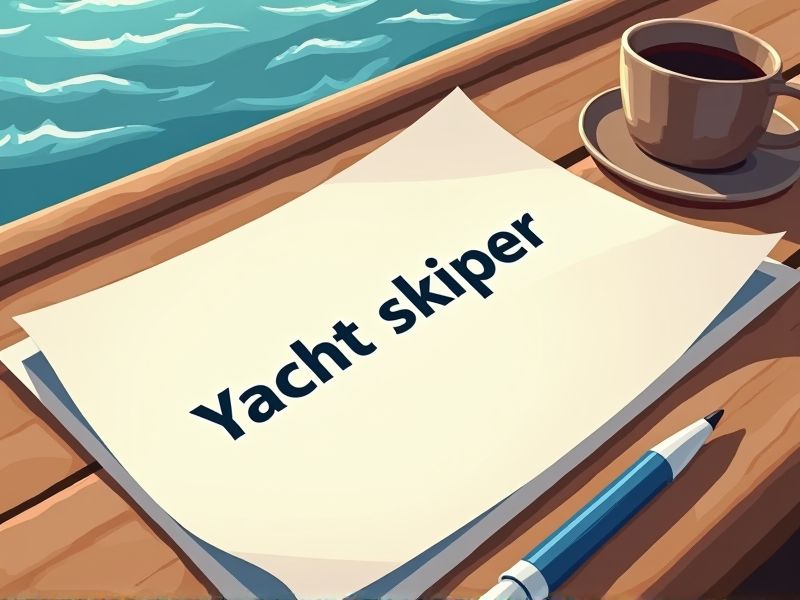
A Yacht skipper is responsible for navigating and managing a vessel, ensuring the safety of passengers and crew. Certifications validate their skills and knowledge in handling diverse maritime situations. Regulatory bodies require these credentials to maintain industry standards and maritime safety protocols. Some pivotal certifications for a Yacht skipper include those listed below.
STCW Basic Safety Training Certificate
The STCW Basic Safety Training Certificate ensures a yacht skipper has fundamental emergency response skills, enhancing crew and passenger safety. Regulations mandate this certification for legal compliance and adherence to international maritime safety standards. Possession of the certificate enhances a skipper's credibility and employment prospects within the yachting industry. The training covers essential areas like fire prevention, first aid, and survival techniques, crucial for handling potential maritime emergencies.
Yachtmaster Certificate (Coastal/Offshore)
The Yachtmaster Certificate (Coastal/Offshore) provides formal recognition of a skipper's advanced seamanship, navigation, and leadership skills, ensuring competence in managing a yacht safely. A certified skipper is likely to gain increased trust from owners or charter companies, often resulting in more opportunities for employment or charter. Many insurance companies require a Yachtmaster Certificate for coverage, as it demonstrates a skipper's ability to handle challenging situations at sea. Maritime authorities in various international waters demand a recognized certificate to legally operate a yacht in their jurisdictions.
GMDSS Radio Operator Certificate
GMDSS Radio Operator Certificate ensures that yacht skippers are equipped to handle communication during emergencies at sea, enhancing safety. It provides knowledge of international maritime communication protocols, crucial for coordinating with rescue services. The certificate requires understanding of equipment operation, which aids in maintaining effective communication in various maritime conditions. Regulatory compliance mandates having certified operators on board to meet international safety standards.
Advanced First Aid Certificate
A yacht skipper with an Advanced First Aid Certificate can better handle medical emergencies at sea, where professional medical help is often delayed. Skippers are responsible for the safety and well-being of their crew and passengers, which includes managing injuries and illnesses. Gaining these skills means they are more equipped to stabilize a situation before professional help is available. The certificate enhances trust and confidence among passengers and crew, potentially leading to a more successful and enjoyable voyage.
Navigation and Seamanship Certification
Navigation and Seamanship Certification provides yacht skippers with essential skills for safe and efficient vessel operation. Accurate navigation reduces the likelihood of getting lost at sea, decreasing the risk of accidents or delays. Understanding seamanship principles ensures skippers can manage various sea conditions and respond effectively to emergencies. Certification often serves as a legal requirement, guaranteeing that skippers meet international standards for safety and competence on the water.
Yacht Skipper Course Certificate
Acquiring a Yacht Skipper Course Certificate equips individuals with the necessary skills and knowledge to safely navigate and operate a yacht. Many coastal regions require this certification as a legal credential to ensure that skippers meet established safety standards. Insurance companies often mandate that potential policyholders have this certificate to qualify for coverage, reducing risks. This certification increases employment opportunities within the maritime industry by demonstrating proficiency and competence to employers.
Radar and Electronic Navigation Certificate
The Radar and Electronic Navigation Certificate equips yacht skippers with essential skills to operate sophisticated navigational equipment, enhancing safety on open water. Maritime regulations often mandate the use of electronic navigation systems, requiring skippers to be adequately trained and certified for compliance. In challenging weather conditions with reduced visibility, radar proficiency ensures that skippers can accurately detect and avoid potential hazards. Competence in electronic navigation systems facilitates efficient route planning and optimized fuel consumption, essential for long voyages.
Engine Room Watchkeeping Course Certificate
Holding an Engine Room Watchkeeping Course Certificate ensures that a yacht skipper has the technical competence to monitor and maintain engine systems effectively. This qualification aids in preventing malfunction-related incidents, promoting safety and reliability during voyages. Yacht regulations often mandate this certification as part of compliance with international maritime standards. The certificate enhances a skipper's credentials, making them more competitive in the maritime job market.
Maritime English Proficiency Certificate
Maritime English Proficiency Certificate ensures clear communication, reducing the risk of misinterpretation during multinational seafaring operations. It enhances safety by equipping yacht skippers to effectively transmit and receive critical information, especially during emergencies. Regulatory compliance often mandates this certification, aligning with international conventions and maritime laws. This certification also boosts a skipper's credibility and employability in the competitive global yachting industry.
Maritime Law and Regulations Course Certificate
A Maritime Law and Regulations Course Certificate equips a yacht skipper with crucial legal knowledge to navigate international waters responsibly. Proper understanding of maritime laws ensures that the skipper can effectively manage and avoid legal disputes involving shipping routes and territorial waters. Obtaining this certification typically promotes compliance with safety standards, potentially reducing risks and liability in accidents. It often becomes a prerequisite for insurance purposes, as insurers generally require proof of a skipper's legal competency to underwrite coverage.
Summary
With the acquisition of certifications, you can anticipate an enhancement in your sailing skills and knowledge as a yacht skipper. These credentials often lead to greater job opportunities and potentially higher income due to recognized expertise. The certification also instills confidence in crew and passengers, leading to safer and more cohesive voyages. Insurance premiums might decrease as insurers often view certified skippers as lower risk.
